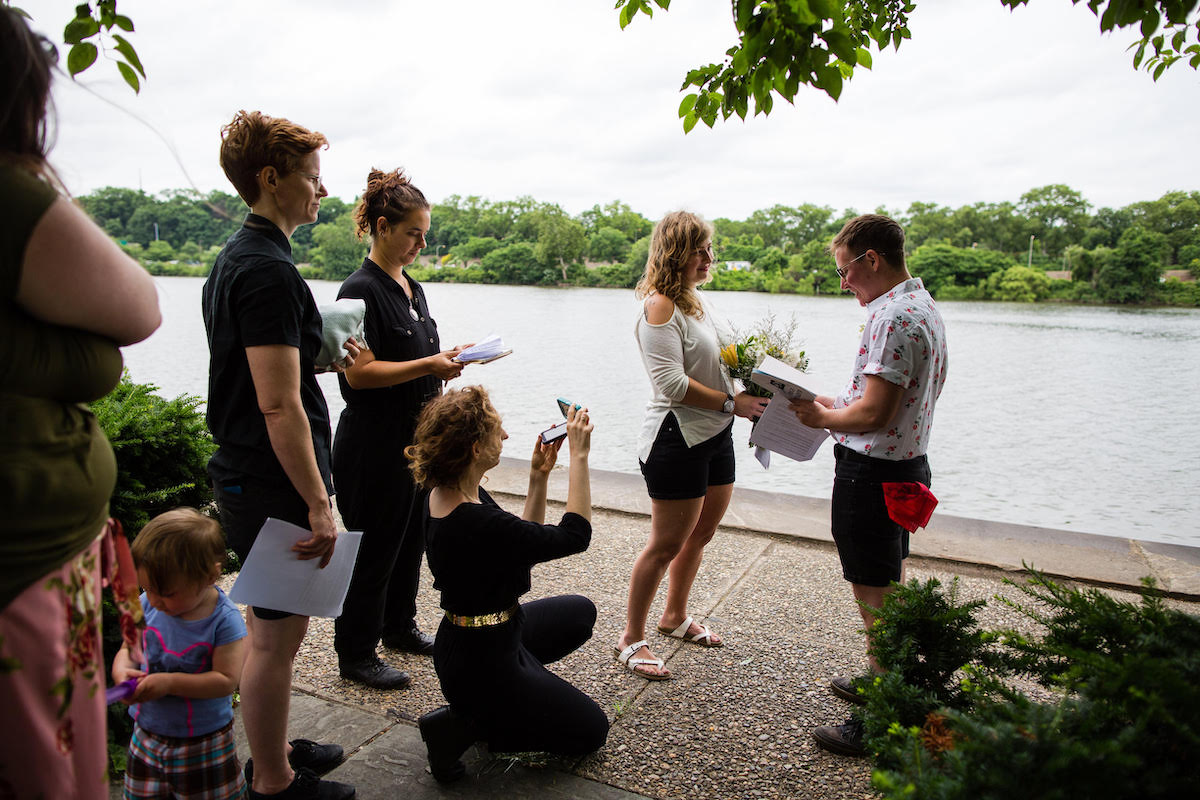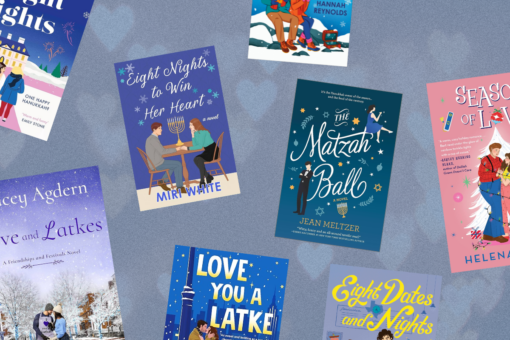Some Jewish traditions view a person’s wedding day almost akin to Yom Kippur: a day of atonement, cleansing, and emotional preparation for the life ahead. But when I got engaged back at the end of August, it wasn’t traditions and concern for my sins that weighed on my mind. Instead, I struggled with how I’d possibly get married without my parents by my side.
Getting married and having a traditional ceremony seemed inevitable as a young Hasidic girl. From fasting from sunrise on the big day, the Yichud room where we would become “one” as a married couple, and how my mother would lead me around my “soon to be husband” as I quietly pray to be blessed with healthy children, this fairytale-like day was nailed down to the last moment. The entire community was meant to celebrate together, hosting seven nights of feasts to bless the young couple.
Now, as a formerly Hasidic queer woman marrying another woman, when I’m asked what I envision my wedding to look like, I honestly can’t picture it. It’s just a gnawing feeling of pain and emptiness that faces me because I know my parents will not be a part of it. Thankfully, queer Jews like me are much more common than I was raised to believe, and this feeling of confusion and loss isn’t my cross to bear alone.
As I prepare for my special day, I wanted to learn from the wisdom of others, like my friend Rabbi Bryan Mann, a queer congregation rabbi in Florida, and two other couples who married without their parents present.
While some people might choose to completely ignore the fact that their parents aren’t there, Rabbi Mann shared some ideas with me for those who want to acknowledge the elephant in the room.
“So often, the covering for the chuppah is something made by a family member, or is a tallit of a deceased loved one. The chuppah is symbolic of the home the couple will build together and they are surrounded by community when they enter it. I could see naming the lack of parents by saying something like, ‘As happy as we are that this room is so filled with love, we cannot ignore that there are those who should be here who are not. Those who should be standing under the chuppah with you. As you enter this chuppah, this symbolic home, my blessing is the home you build together will be filled with love for anyone who enters it.’”
When I asked him about the Jewish tradition of breaking a glass at the end of the ceremony, Rabbi Mann’s response brought me to tears. “There are many different interpretations of what the breaking of the glass represents. For me, I often talk about how it represents the brokenness in the world and how we hope the love of the couple, and love in the room helps heal some of that brokenness. It would make sense to recognize the specific brokenness and pain of not having supportive parents at this point, if the couple wants to explicitly mention it.”
I then talked with Chana and Catherine, a queer mixed-faith couple who have been together for two years and eloped. They met, like many folks these day, online — specifically on a queer app called HER. Chana told me about their first date and how they met.
“Everything that could possibly go wrong on our first date went wrong,” she said. “The restaurant I chose was a total flop and I stupidly suggested going to the beach on a windy night. Of course sand got in everything and everywhere. But the one thing that was perfect was the chemistry and how comfortable we were with each other.”
When it came to their decision to elope, Chana mentioned how family and finances played a large role in that decision. “Catherine and I didn’t have the money to have a wedding (because I spent it all on the ring). A big reason [for eloping] was because my family was really against it and we just decided what was best was doing something private, just celebrating with our close friends.”
Since weddings can be emotional even when your parents are there, I wanted to learn more about how they coped with that.
“It was pretty difficult for me, being that I’m pretty close with my family. I always said to myself that I can’t make everyone happy; I need to focus on my happiness. And that’s what I did. Whether my family was supportive or not, it didn’t matter. Catherine and I had each other. We were going to start our own family and do things differently and have a home where we loved our kids and supported our kids no matter what.”
I also spoke to Ray Rachlin and Asher Freeman to learn about how they met and married. They have been together since 2013 and never planned on making it past casually dating.
“Our love story began like so many modern queer love stories, with both of us looking for casual dates on the internet. We both had extremely strong boundaries, and for months, we met up one evening a week, ensuring that our fling didn’t interfere at all with our individual lives,” they told me.
Obviously, that plan didn’t quite work. When Ray injured their back, Asher stepped in and became quite a support system for Ray. That was what helped turn their once-casual relationship into an eventual marriage.
When it came to their Jewish wedding, they sprinkled in some unique twists on tradition. “After sharing our vows, our friends read the Seven Blessings out loud, we drank from a kiddush cup, we took turns smashing a glass that read ‘patriarchy,’ and we all sang ‘Hineh Ma Tov.’ Once the ceremony was complete, we drank sparkling cider from the bottle and ate our celebratory cannolis.”
When it came to their parents being at the wedding, that was another unique situation for Ray and Asher. Since Ray hadn’t spoken to their father since age 18, there wasn’t much of a conversation there. Ray did tell their mother last minute about the wedding, but told her not to come. Instead, they found a compromise and FaceTimed Asher’s parents and Ray’s mom.
Both couples left me with some advice for queer Jewish folks who are planning their wedding. Asher and Roy told me to consider not having a traditional wedding. As they look back on their elopement a year later, they said, “While parts of our wedding felt complicated and hard in the moment, we both feel that we made the right decision to elope. As more time passes, we feel more grateful for the ease and simplicity with which we took this step together.”
Chana and Catherine, on the other hand, had this advice to share: “Just focus on you two and try to not to work too hard pleasing everyone else. Remember this is your day. Also try to save some money on your wedding and put that money towards your honeymoon. It will be the best decision you make.”
As I look forward to — and slowly begin to plan — my own wedding, I still occasionally dissolve into tears, yet I find so much strength hearing the experiences of others and learning new ways to view traditions. As I’ve learned, these traditions are mine to make my own. Ultimately, I will acknowledge my loss and pain while looking forward to the next part of my life journey.



